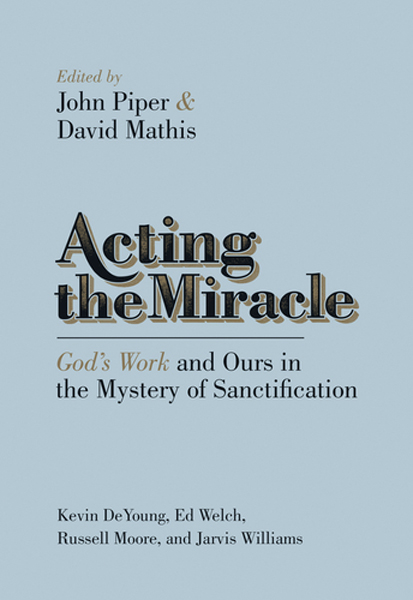
John Piper & David Mathis
Reviewed by: J. V. Fesko
Acting the Miracle: God's Work and Ours in the Mystery of Sanctification, edited by John Piper and David Mathis. Crossway, 2013. Paperback, 174 pages, list price $16.99. Reviewed by OP minister and seminary professor J. V. Fesko.
Acting the Miracle, edited by John Piper and David Mathis, is the latest contribution to a burgeoning field of conferences and books on sanctification. The book is based upon the most recent national conference of Desiring God Ministries and includes contributions by Piper, Mathis, Kevin DeYoung, Russell Moore, Ed Welch, and Jarvis Williams. Each chapter covers the speaker's original conference address and concludes with a transcript of a Q&A session.
The book offers a helpful overview of sanctification in its doctrinal and practical aspects. Piper's exegesis and doctrinal definition is matched by exegetically based pastoral and practical reflection from the other contributors. DeYoung, for example, resists the trend to find a silver-bullet motivation for sanctification and surveys a number of biblical ideas. Welch offers a useful chapter on bringing Scripture to bear upon certain common problems, such as ADHD, depression, and panic attacks. Psychiatric disorders do not mean that sanctification is stalled or that Scripture has nothing to say. Williams and Moore offer broad overviews of the role of the church and the means of grace in the process of sanctification, which should encourage readers to reconsider the role of Scripture, prayer, and church discipline in sanctification.
There are, however, a few areas that will likely leave some readers looking for more information. Piper, for example, defines sanctification as "the action by which we bring our feelings and thoughts and acts into conformity to the infinite and all-satisfying worth of God" (p. 36). While Piper seeks to explain what he means by the "worth of God," the definition is vague. His definition says nothing about God's work in sanctification. By comparison, the Shorter Catechism offers a brief but precise statement that mentions God's role and our responsibility (Q. 35).
Another missing element is the slight attention given to the role of the law in sanctification. Only in the Q&A transcript does the third use of the law receive attention (pp. 148–50). On a similar note, as helpful and important as reading and meditating upon Scripture is, this book seems to reflect the idea that the center of gravity in our sanctification is in private devotions rather than the church gathered in worship. Private devotions are necessary, but the preaching of the word and the administration of the sacraments must take center stage; these are God's appointed and objective means of grace. The book briefly mentions the Lord's Supper as a means of grace, but not baptism (pp. 142–43)—while identifying Christian biographies as means of grace (p. 143).
Readers can benefit from this book, but they should supplement their reading with the Westminster Standards to see what elements are missing, so they may be fully equipped to grow in holiness and sanctification.
April 27, 2025
The Devoted Mind: Seeking God’s Face in a World of Distraction
April 20, 2025
April 13, 2025
Suffering: God’s Purpose in Our Pain
April 06, 2025
Sunday Matters: 52 Devotionals to Prepare Your Heart for Church
March 30, 2025
On the Trail with a Missionary
March 23, 2025
Midnight Mercies: Walking with God Through Depression in Motherhood
March 16, 2025
© 2025 The Orthodox Presbyterian Church